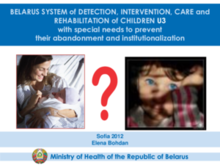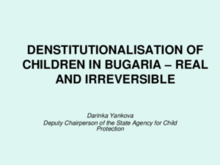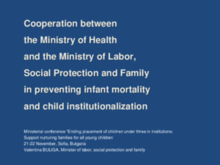Displaying 461 - 470 of 580
This report and research conducted by SOS Children’s Villages reviews alternative care arrangements in Tanzania.
This document provides a conceptual framework for Family for Every Child, a global network of national civil society organisations working to mobilise knowledge, skills and resources to build a world where every child grows up in a permanent, safe and caring family, and to provide quality alternative care where needed.
The World Family Map Project is a new initiative by Child Trends to monitor the health of family life around the globe and to learn more about how family trends affect the well-being of children. Using internationally comparative data for low-, middle-, and high-income countries on key characteristics of families, including family structure, family socioeconomics, family processes, and family culture, the Map looks at trends in 45 countries, representing every region of the world.
In this paper, the author argues that the response to the orphan crisis in sub-Saharan Africa has focused mainly on mobilizing and distributing material resources to households with orphans. Only a few anthropologists have interrogated the frameworks and values on which the projects for orphans are based. The paper provides an analysis of the trends in foster-care research in Africa and the author suggests that current ethnographic data on foster-care practices do not adequately reflect the changing context of fostering in that continent.
In its Annual report (2011-2012), the Indian Ministry of Women and Child Development reports on progress in the implementation of the Integrated Child Protection Scheme (ICPS), a new policy and programmatic strategy that specifically articulates the need to move away in approach and services from over-reliance on institutional care and towards responses that support family based care.
This literature review summarizes the research on children who live apart from their parents and identifies gaps in knowledge regarding this vulnerable population. This literature review was developed as a step toward designing the National Survey of Children in Nonparental Care, a nationally representative telephone survey of adults caring for these children.
This presentation to the 2012 Sofia Conference introduces social services available in Belarus for the identification, intervention, care, and rehabilitation of children under the age of 3 with disabilities, in order to prevent their abandonment and placement in institutions.
This presentation to the 2012 Sofia Conference by Darinka Yankova, Deputy Chairperson of the State Agency for Child Protection addresses the challenges and the new vision for the deinstitutionalization of children in the Republic of Bulgaria.
This presentation to the 2012 Sofia Conference by Valentina Buliga, Minister of Labor in Moldova, Social Protection and Family, introduces Moldova's ongoing collaboration between the Ministry of Health and the Ministry of Labor to reduce infant mortality and the placement of children under the age of 3 in institutions.
This inter-agency paper was written by Family for Every Child, Better Care Network, Consortium for Street Children, Save the Children, SOS Children’s Villages, and World Vision, for submission to the United Nations consultation: ‘Health in the Post-2015 Development Agenda.’ It examines the links between child protection and health and argues for a continuing focus on health and child survival that encompasses particular goals and indicators on children’s protection.








